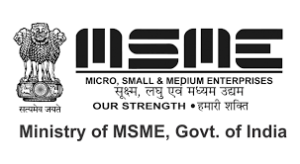All you need to know about MSME Sector in India
What is MSME?
MSME or Micro, Small, Medium Enterprises (MSMEs) have been credited as the engine of economic growth and a tool for for promoting equitable development. In India the MSMEs play a fundamental role in the economy and it is estimated that in the terms of value, the sector accounts for about 39% of the manufacturing output and around 33% of the total export of the country (source: ministry data). As per the records, MSME’s produce over 8,000 value-added products. The major advantage of the sector is its employment potential at low capital cost. As per available statistics, this sector employs an estimated 31 million persons spread over 12.8 million enterprises and the labour intensity in the MSME sector is estimated to be almost 4 times higher than the large enterprises.
MSME Registration
The numerous benefits provided by the MSME act can only be availed by business units who get themselves registered under the act. These benefits include priority sector lending, excise and direct tax exemptions, capital investment subsidies and power tariff subsidies. To benefit from any of the rewards; the new or existing business should have MSME Certificate. The registration scheme has no statutory basis. However, a medium enterprise engaged in the manufacture or production of goods has to compulsorily register under the MSMED Act. Units would normally get registered to avail some benefits, incentives or support given either by the Central or State Govt.
Categorization Criteria
Based on the investment range your business will be categorized as Micro or Small or Medium enterprise in both manufacturing and service sectors.
|
No. |
Type of Enterprise |
Manufacturing Enterprises (Investment in Plant and Machinery) |
Service Industry (Investment in equipment) |
|
1. |
Micro |
Does not exceed Rs. 25 Lakh |
Does not exceed Rs. 10 Lakh |
|
2. |
Small |
Exceeds Rs. 25 Lakh but does not exceed Rs. 5 Crore |
Exceeds Rs. 10 Lakh but does not exceed Rs. 2 Crore |
|
3. |
Medium |
Exceeds Rs. 5 Crore but does not exceed Rs. 10 Crore |
Exceeds Rs. 2 Crore but does not exceed Rs. 5 Crore |
An MSME (Micro, Small and Medium Enterprise) is defined by RBI/GOI differently for the Manufacturing and the Services Sector, as follows:
Manufacturing Sector
Manufacturing sector refers to enterprises engaged in manufacture or production, processing or preservation of goods. The definition of Micro, Small and Medium Enterprises under the manufacturing sector is based on the Investment in plant and machinery [original cost excluding land and building] and the items as specified by the Ministry through its various notifications.
Services Sector
Services sector refers to enterprises engaged in providing or rendering of services. These will include small road & water transport operators (owning a fleet of vehicles not exceeding ten vehicles), small business (whose original cost price of the equipment used for the purpose of business does not exceed Rs.20 lakh) and professional & self employed persons (whose borrowing limits do not exceed Rs.10 lakh of which not more than Rs.2 lakh should be for working capital requirements except in case of professionally qualified medical practitioners setting up of practice in semi-urban and rural areas, the borrowing limits should not exceed Rs.15 lakh with a sub-ceiling of Rs.3 lakh for working capital requirements). The definition of Micro, Small and Medium Enterprises under the services sector is based on the enterprise’s investment in equipments.

Lately, most of the banks have supported the MSMEs by launching special fund schemes to meet the capital requirements of MSMEs. The MSME sector has grown by leaps and bounds and has caught the fancy of corporate India. In fact, MSMEs have fared better than most large organizations in the last decade.
Benefit available through registration of Micro, Small and Medium (MSM) Enterprises under MSMED Act is a very powerful medium to enjoy the regime of incentives offered by the Centre. These include:
1. Easy finance availability from Banks, without collateral requirement
2. Protection against delay in payment from Buyers
3. Preference in procuring Government tenders,
4. Stamp duty and Octroi benefits
5. Concession in electricity bills
6. Reservation policies to manufacturing / production sector enterprises
7. Time-bound resolution of disputes with Buyers through conciliation and arbitration
8. Reimbursement of ISO Certification Expenses
9.Credit prescription (Priority sector lending), differential rates of interest etc.
10.Excise Exemption Scheme
11.Exemption under Direct Tax Laws.
12.Statutory support such as reservation and the Interest on Delayed Payments Act.
13.Subsidy on NSIC Performance and Credit ratings
14.Participation in Government Purchase registrations
15. Registration with NSIC
16. Counter Guarantee from Govt of India through CGSTI
17.Waiver in Earnest Money (Security Deposit ) in Govt tenders
18. Upto 15% weightage in price Preference.
19. Reduction in rate of Interest from banks (Subject to ratings)
20. Easy finance availability from Banks, without collateral requirement
21.Reservation policies to manufacturing / production sector enterprises
Apart from this, the government has introduced Credit Linked Capital Subsidy Scheme for technology upgradation by providing capital subsidy(limited to maximum Rs. 15 lakhs) for purchase of plant and machinery.
The states/union territories have their own package of facilities and incentives for small scale. Both the Center and the State, whether under law or otherwise, target their incentives and support packages generally to units registered with them. Taking into consideration the benefits available under the Act, it is highly recommended that every eligible enterprise should opt for the registration.
Are you looking for MSME registration? We can help. Get in touch and our expert can help you in getting an MSME certificate for your business.
